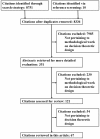Decision-theoretic designs for small trials and pilot studies: A review
- PMID: 26048902
- PMCID: PMC4876428
- DOI: 10.1177/0962280215588245
Decision-theoretic designs for small trials and pilot studies: A review
Abstract
Pilot studies and other small clinical trials are often conducted but serve a variety of purposes and there is little consensus on their design. One paradigm that has been suggested for the design of such studies is Bayesian decision theory. In this article, we review the literature with the aim of summarizing current methodological developments in this area. We find that decision-theoretic methods have been applied to the design of small clinical trials in a number of areas. We divide our discussion of published methods into those for trials conducted in a single stage, those for multi-stage trials in which decisions are made through the course of the trial at a number of interim analyses, and those that attempt to design a series of clinical trials or a drug development programme. In all three cases, a number of methods have been proposed, depending on the decision maker's perspective being considered and the details of utility functions that are used to construct the optimal design.
Keywords: Bayesian decision theory; optimal clinical trial design; phase II clinical trials; utility functions.
© The Author(s) 2015.
Figures
References
-
- Lancaster GA, Dodd S, Williamson PR. Design and analysis of pilot studies: recommendations for good practice. J Eval Clin Pract 2004; 10: 307–312. - PubMed
-
- Arnold DM, Burns KEA, Adhikari NKJ, et al. The design and interpretation of pilot trials in clinical research in critical care. Crit Care Med 2009; 37: S69–S74. - PubMed
-
- Pocock SJ. Clinical trials: a practical approach, Chichester: Wiley, 1983.
Publication types
MeSH terms
LinkOut - more resources
Full Text Sources
Other Literature Sources


